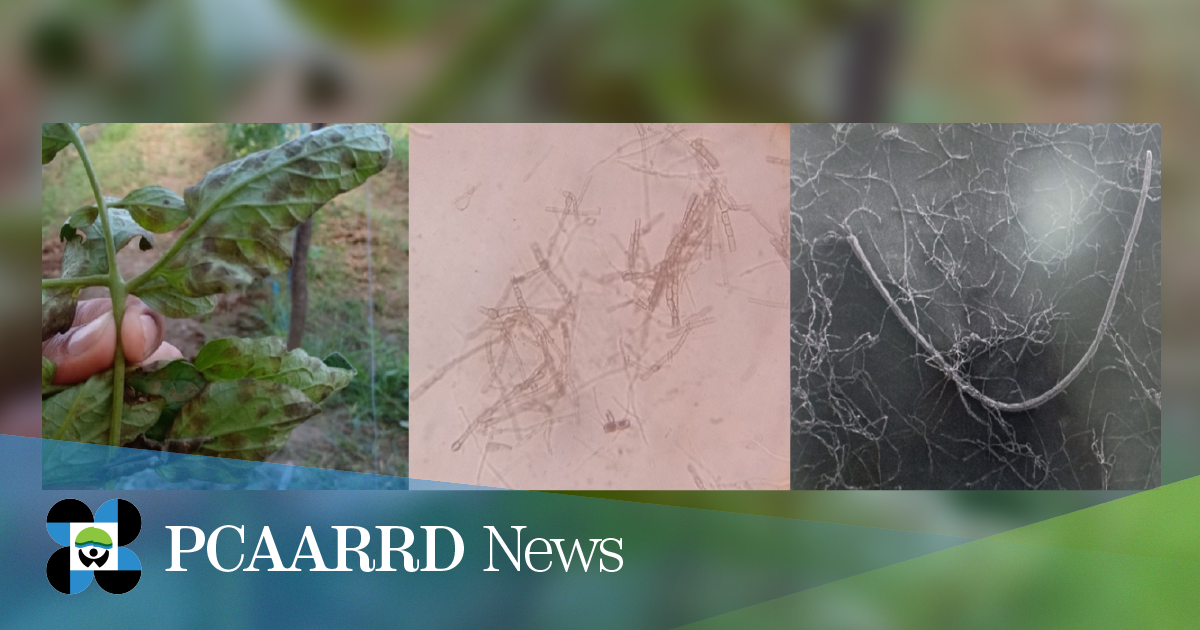A biofungicide derived from entomopathogenic fungi (EPF), specifically Beauveria bassiana and Isaria fomosorosea, was developed and field-tested as a biological control agent (BCA) against tomato black leaf mold (TBLM).
TBLM is caused by the fungus Pseudocercospora fuligena, which causes the growth of brown mold on leaf surfaces. At a severe infection rate, it can cause severe leaf damage, reduced fruit quality, and significant yield losses.
The biofungicide was developed by Nueva Vizcaya State University (NVSU) through the project, “Development of Formulated Entomopathogenic Fungi (EPF) as Biofungicide against Tomato Black Leaf,” led by Dr. Jonar I. Yago, NVSU Vice President for Research, Extension, and Training. Collaborating with NVSU in this project are the Provincial Agriculture Office, Municipal Agriculture Office, Department of Agriculture Regional Field Offices 1, 2, and 3, Tomato Growers Association, and the local government units of Kasibu, Kayapa, Sta. Fe, and Dupax del Sur in Nueva Vizcaya; Bongabong and San Jose in Mindoro; Badoc in Ilocos Norte; and Sinait in Ilocos Sur.
Results of the trials
In a tomato growing area in Kasibu, Nueva Vizcaya, where disease severity of TBLM ranged from 16.75% to 24.65%, use of EPF biofungicide significantly decreases disease severity from 7.30% to 7.35%, compared with the disease severity of plants applied with synthetic fungicides at 9%.
The biofungicide also reduced TBLM disease severity from 43.12% to 8.12–8.50% in San Jose City, Nueva Ecija, and from 42.35% to 6.59–7.11% in Cadanglaan, Sinait, Ilocos Sur.
This figure is a stark difference from the 12.35% disease severity of TBLM in tomato plants treated with synthetic fungicide.
In terms of yield, the biofungicide showed significantly higher yields of up to 2.6 kg per plant or up to 26 tons per hectare (t/ha). This is higher than the yield of tomato plants applied with synthetic fungicide, with 2.3 kg per plant or 23 t/ha, and control plants without any application, with 0.72 kg per plant or 7.2 t/ha.
According to the researchers, results of the trials challenged farmers’ dependence on synthetic fungicides and highlighted the biofungicide as the more sustainable and effective solution to managing TBLM and increasing productivity in the tomato plantation.
To promote the EPF biofungicide and convince farmers to end their reliance on synthetic fungicides, the project team trained the 182 farmer-participants in Regions 1, 2, and 3 on biological control of TBLM using the formulated EPF biofungicide. As part of the support of the project team, two isolates were provided to 16 Regional Crop Protection Centers to be added as BCAs against insect pests.
Sustainable technology for better income
The EPF-derived biofungicide would entail P156,711.25, which is P9,138.75 less than the cost of the synthetic fungicide per hectare, while yield per hectare for the biofungicide is at 22,480 kg, which is 4,320 kg more than the yield of tomatoes that used synthetic fungicide.
Using the biofungicide, the farmer’s net income can reach up to P292,888.75 per hectare (/ha), which is almost P100,000/ha difference from the plantation that used synthetic fungicide.
The said project is an entry/finalist under the Research Category in the National Symposium on Agriculture, Aquatic and Natural Resources Research and Development (NSAARRD) on October 2, 2024. Winners of the award will be conferred during the DOST-PCAARRD’s 2024 S&T Awards and Recognition ceremony in November 2024.
NSAARRD, annually spearheaded by DOST-PCAARRD, recognizes outstanding contributions in the agriculture, aquatic, and natural resources sector in the country.

